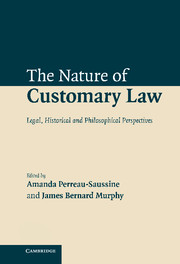Book contents
- Frontmatter
- Contents
- List of contributors
- Table of cases
- The character of customary law: an introduction
- Part I Custom and morality: natural law, customary law and ius gentium
- Part 2 Custom and law: custom, common law and customary international law
- 7 Custom in medieval law
- 8 Siege warfare in the Early Modern Age: a study on the customary laws of war
- 9 The idea of common law as custom
- 10 Three ways of writing a treatise on public international law: textbooks and the nature of customary international law
- 11 Custom, common law reasoning and the law of nations in the nineteenth century
- 12 Custom in international law: a normative practice account
- 13 Customary international law and the quest for global justice
- Index of names
13 - Customary international law and the quest for global justice
Published online by Cambridge University Press: 30 June 2009
- Frontmatter
- Contents
- List of contributors
- Table of cases
- The character of customary law: an introduction
- Part I Custom and morality: natural law, customary law and ius gentium
- Part 2 Custom and law: custom, common law and customary international law
- 7 Custom in medieval law
- 8 Siege warfare in the Early Modern Age: a study on the customary laws of war
- 9 The idea of common law as custom
- 10 Three ways of writing a treatise on public international law: textbooks and the nature of customary international law
- 11 Custom, common law reasoning and the law of nations in the nineteenth century
- 12 Custom in international law: a normative practice account
- 13 Customary international law and the quest for global justice
- Index of names
Summary
Hope without fear?
Customary international law (CIL) excites both hope and fear among international lawyers. It excites hope among partisans of the idea that international law is an important means for advancing the cause of global justice; indeed, they would go further and insist that international law's legitimacy – the very justifiability of its claim to set normative standards for its subjects – turns on whether it gives adequate expression to the demands of global justice. I use the label ‘global justice’ in a broad sense, to encompass moral values and principles, including but not limited to the minimalist values of peaceful co-existence and co-operation, that should be respected by all states whether in their internal affairs (transnational justice) or in their relations with other states (international justice). The requirements of global justice include norms establishing human rights, authorizing humanitarian intervention and assistance, enjoining environmental protection, and so on. But how can morally attractive standards of this sort, which are regularly flouted throughout the world today, acquire the status of international laws that are opposable against all states?
Reliance upon treaties is prey to well-known difficulties: not all states have signed up or are likely to sign up to norms of the relevant type. Moreover, many states that have formally agreed to such norms have done so subject to eviscerating reservations.
- Type
- Chapter
- Information
- The Nature of Customary LawLegal, Historical and Philosophical Perspectives, pp. 307 - 335Publisher: Cambridge University PressPrint publication year: 2007
- 11
- Cited by



